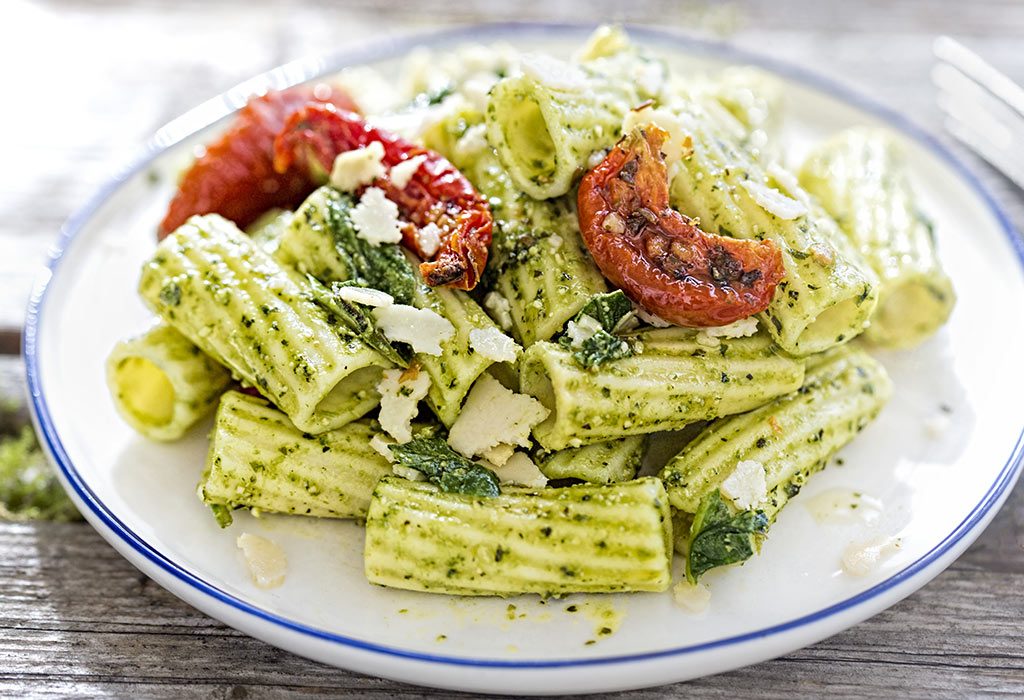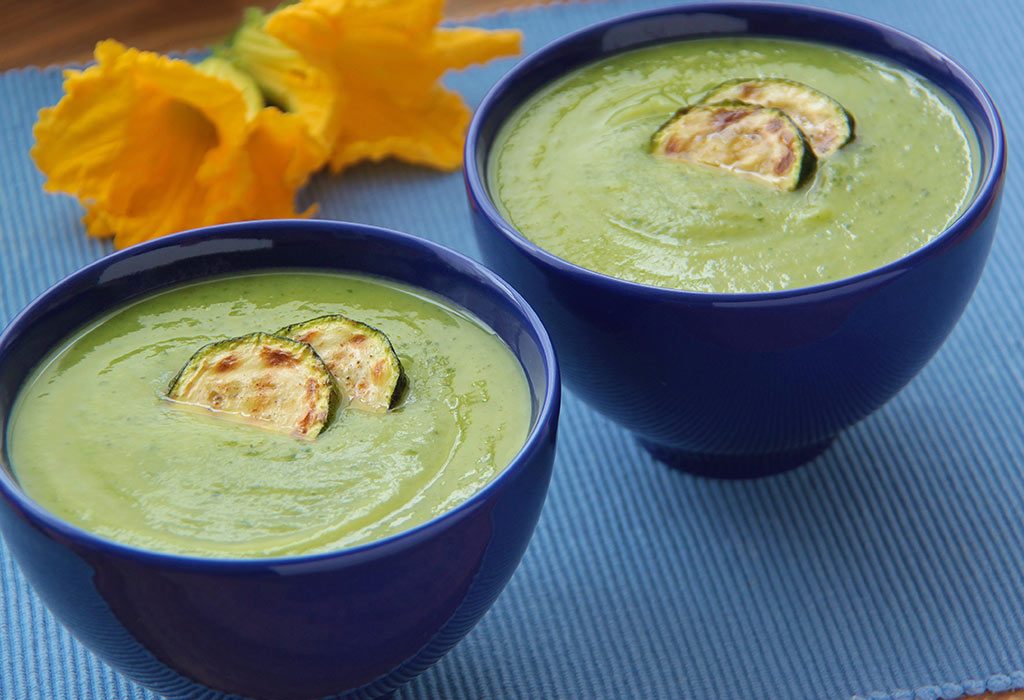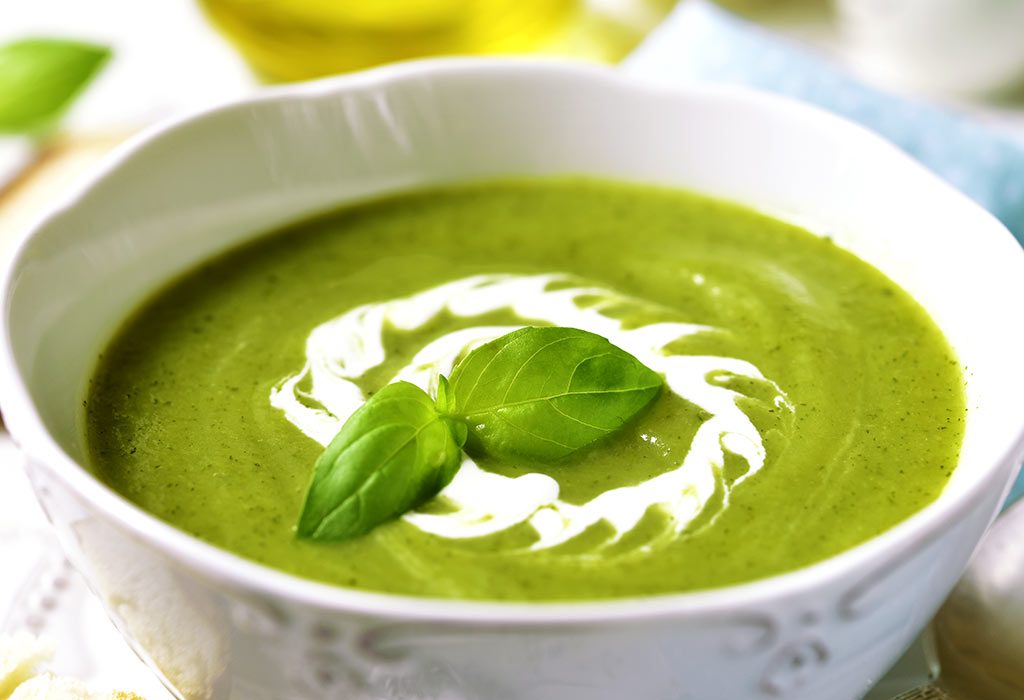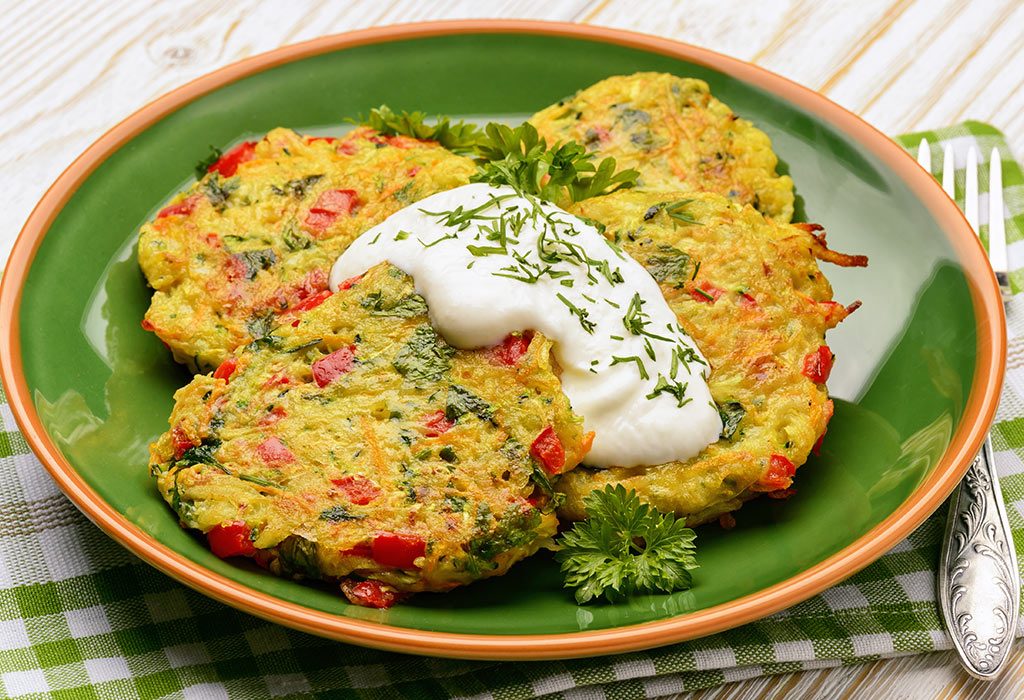In this Article
- What is Zucchini?
- Nutritional Value of Courgette
- Is it Safe to Give Zucchini to Infants?
- When Can You Introduce Zucchini to a Baby?
- Health Benefits of Zucchini for Babies
- Can You Give Raw Zucchini to Your Baby?
- Quick and Easy Courgette Recipes for Babies
- Measures to Take While Giving Courgette to Your Baby
- FAQs
As soon as the baby comes into the world, you will have questions in your mind regarding his health and foods that can be introduced to him after 6 months. It is normal for parents to be confused about the diet for their baby, as it can affect the child positively and negatively in a huge manner. Right from the newborn stage, it is extremely important to ensure that your child gets the right amount of nutrients necessary for unhindered growth throughout.
What is Zucchini?
Zucchini is the vegetable which can be grown at any time of the year. Although the vegetable is native to the American continent, it quickly gained traction in Europe around three centuries ago. It was a staple diet of South Americans for many centuries, as they liked it for its high-nutrient content. Zucchini is also known by the name ‘courgette’.
Nutritional Value of Courgette
| Nutrients | Amount per 124 grams |
| Carbohydrates | 4.2 grams |
| Protein | 1.5 grams |
| Fat | .2 grams |
| Calcium | 18.6 mg |
| Iron | .4 mg |
| Magnesium | 21.1 mg |
| Dietary Fibre | 1.4 grams |
| Vitamin C | 21.1 mg |
Source: http://nutritiondata.self.com/facts/vegetables-and-vegetable-products/2639/2
Zucchinis contain most of the nutrients that a baby needs, so it would be a good addition to a baby’s diet plan right from an early age.
Is it Safe to Give Zucchini to Infants?
This vegetable is perfectly safe for children, so it can be given to him from the very first year of his life. You can start incorporating it into his diet from the age of ten months, as it may cause an allergic reaction.
When Can You Introduce Zucchini to a Baby?
In order to reduce the chances of an allergic reaction in a baby, it would be best to introduce the zucchini until he is around eight to ten months old.
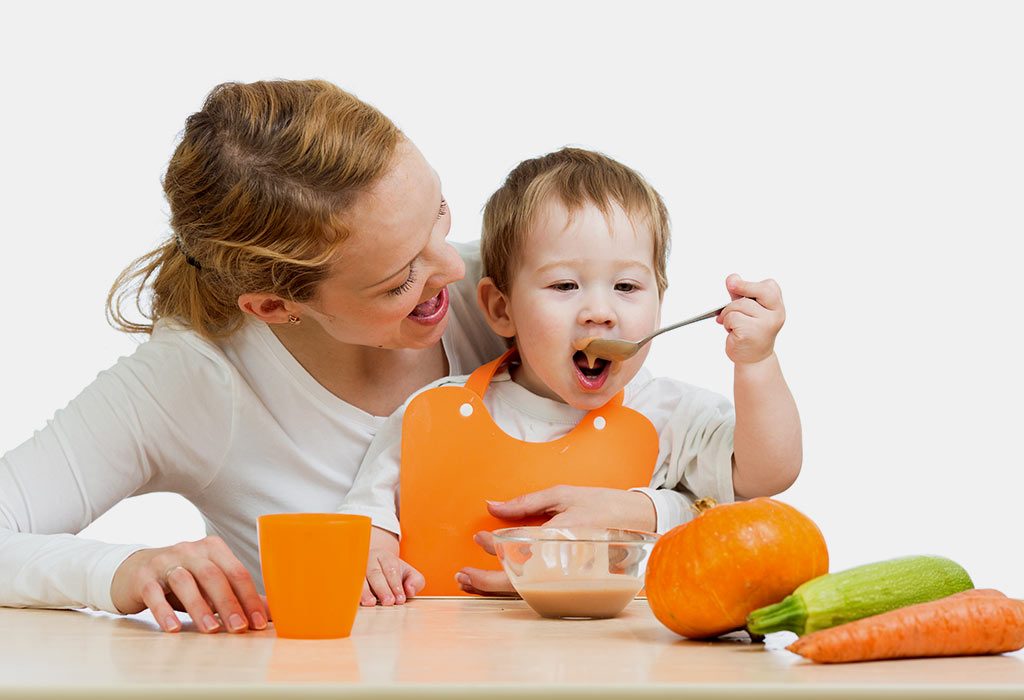
Health Benefits of Zucchini for Babies
As mentioned above, zucchinis have a lot of health benefits to offer to your baby. Some of these benefits are mentioned below:
1. Calcium Content
Courgette or zucchini contains calcium which is needed for bone development and teeth of a child. It also plays a part in transporting the nutrients within the body.
2. A Lot of Magnesium
Magnesium also plays an equally important role in the development of bones, gums, and teeth of a child. It also aids in digestion, as it triggers the enzymes needed for digestion and controls the urinary bladder.
3. Phosphorous Supply
Zucchinis contain a whole lot of phosphorous, which plays a part in facilitating a number of bodily functions. Numbness and fatigue are combated by this mineral, and it also plays a part in the development of the brain.
4. Helps the Immune System
Courgettes contain Vitamin C, which is important for the development of the child. The development of immune system depends on the amount of Vitamin C available to the body, as it is necessary for the production of mucus and other bodily fluids.
5. Vitamin B
The B complex vitamins are made up of Vitamin B-6, niacin, thiamine, folate, and a few other vitamins. These are necessary for metabolic activities, the functioning of the immune system, production of energy and to produce RBCs in the body.
6. Easy-to-digest
Even though zucchinis contain a lot of vitamins and minerals, these are easily digested by the stomach of the baby. It is mainly made up of water and is rich in fibre content. If your child ever suffers from any digestive problem, zucchinis can prove to be one of the best remedies.
Can You Give Raw Zucchini to Your Baby?
For older babies, raw zucchini slices may turn out to be a tasty, healthy snack. However, the texture of the vegetable may make it a choking hazard to younger babies, although there are no other problems with serving it raw. So, consider the eating habits and age of your baby, before serving it raw to the child.
Quick and Easy Courgette Recipes for Babies
You might be wondering how to cook zucchini for baby finger food in a tasty manner, so a few great zucchini baby food combinations are given below.
1. Roasted Zucchini Squash
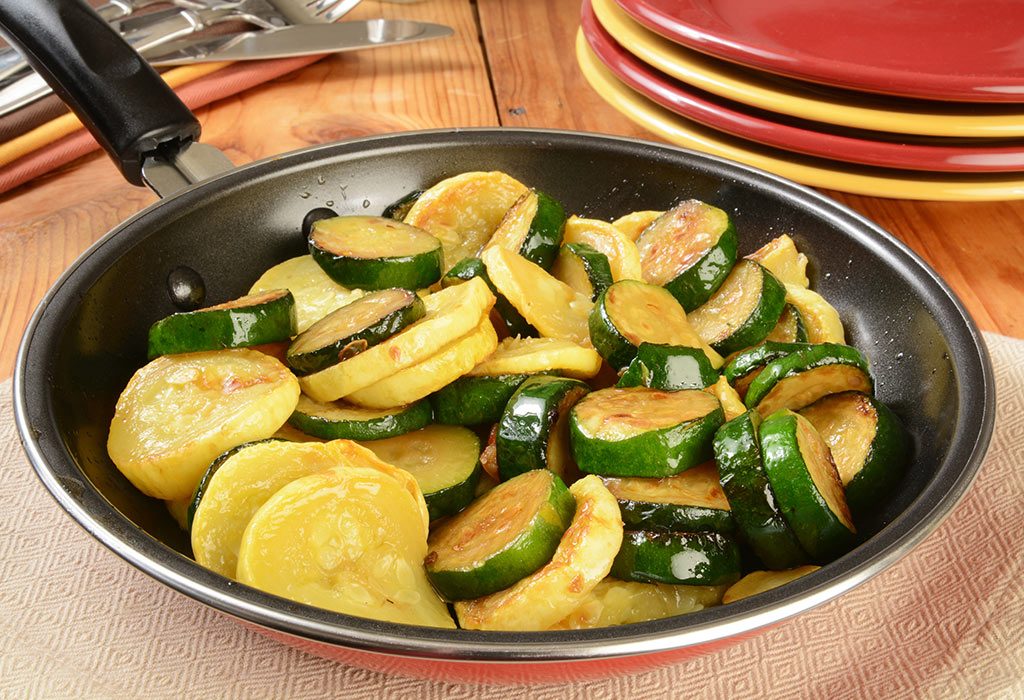
Prepare roasted zucchini squash for a wholesome meal; use minimal oil while making it.
Ingredients
- Three medium-sized zucchinis
- A small onion
- Olive oil
- Paprika (smoked)
Recipe
First, cut the zucchinis and onions and sprinkle an adequate amount of paprika over these cubes. Drizzle some olive oil as well. For a little more than 30 minutes, roast the cubes at 400 degrees in the oven and then let it cool at room temperature. Blend these roasted cubes using a blender into a smooth mixture.
2. Pasta with Zucchini
Go Italian with the recipe mentioned below:
Ingredients
- One or two medium sized zucchinis
- A cup of pasta
- An adequate amount of olive oil
- Pepper and salt
- Cheese and bell peppers
Recipe
Boil the vegetable until it becomes soft, and cook pasta in another pot. After draining the water of the pasta, add some olive oil to it so that it does not stick. Smash the boiled courgette and add it to the pasta, and mix well. Sprinkle salt and pepper in required amounts, and garnish with cheese and bell pepper if your baby is older than eight months.
3. Zucchini Pea and Corn Puree
Does your child have tooth problems? Let him munch on this amazing dish.
Ingredients
- Two small courgettes
- A cup of corn kernels
- A cup of baby peas
Recipe
The first step is to make all of the ingredients soft and tender by boiling it in water for around five minutes. Using a blender, you can blend these ingredients without water to get a paste-like mixture. If necessary, add some water to reduce the thickness of the mixture.
4. Zucchini Soup
A nutritious meal to serve your kids when they are sick:
Ingredients
- A medium-sized potato
- A medium-sized courgette
- One clove of garlic
- A tablespoon of yoghurt
- Olive oil
- 1.5 cups of vegetable stock
Recipe
Sauté some onions and garlic until they turn tender. Now, slice the potato into small cubes and add it to the pan, cook it over low heat for around fifteen minutes. Then, add the cubed zucchinis to the pan and cook it for five more minutes. Add the vegetable stock to the mixture, and let it boil. You can then stir in the yoghurt and serve.
5. Zucchini and Carrot Fritters
Combine zucchini with the goodness of carrots which are high in fibre and help in digestion.
Ingredients
- A medium-sized courgette
- A medium-sized carrot
- One small onion
- Half a cup of flour
- One-third cup of ricotta cheese
- An egg
- A quarter teaspoon of cayenne pepper
- Olive oil
Recipe
Grate the carrot and zucchini and chop the onion. Mix these vegetables in a bowl, and add an egg, pepper, flour, and cheese to the mixture. Mix it well. Add olive oil to the pan and pour the mixture on the pan in small quantities and let the fritter cook until it turns golden brown.
You can experiment with the vegetable to get more zucchini recipes for baby.
Measures to Take While Giving Courgette to Your Baby
You need to check a few things before feeding zucchini to your child:
1. The Size of the Courgette
The sizes of zucchinis can vary from as small as ten centimetres to more than a foot, so picking one can be hard for parents. The smaller ones are soft and easier to digest for children.
2. Storing Zucchinis
This vegetable cannot last for more than four days, even if you refrigerate it. Ensure that you store them in dry, cool temperatures, rather than moistening it or freezing it.
3. Preparing Courgettes
Give the outer layer of the vegetable a thorough rinsing, so that any dirt or pesticide residue is washed away. If it is organic, the skin can be consumed, otherwise, peel off the skin.
4. Cooking
In case you are feeding it directly to your child, the best thing to do will be to steam-boil it for a few minutes so that the nutrients are retained.
FAQs
Below are some common questions about Zucchini that parents generally ask.
1. Should I Peel Zucchini for Baby Food Recipes?
The skin has most of the nutrients the child requires so peeling the skin will be counter-productive. If you feel that your child may have a difficulty in digesting the skin, you can peel it off.
2. Should I Remove the Seeds While Making Baby Food?
If it is a small or medium-sized zucchini, the seeds are tender enough to be mashed or pureed. However, the larger ones may have thicker skin and harder seeds, so it would be best to not feed it to your child.
Zucchini contains a whole lot of nutrients that are necessary for the proper growth of the child, so it would be a great addition to his diet. However, remember to wait until he turns ten months so that there are no problems with allergies or digestion of the vegetable.



